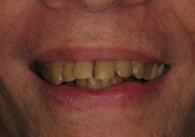Periodontal (gum) disease
Nature of the disease and treatments
What is the nature of gum disease? Does it hurt?
Periodontal (gum) disease is an infection of the tissues that support your teeth. It is caused by plaque, a sticky film of bacteria that forms on your teeth and gums. If plaque is not removed through
regular brushing, flossing, and dental cleanings, it can harden into tartar, which can only be removed by a dentist or dental hygienist. Tartar buildup can cause the gums to become inflamed, leading
to gum disease.
The nature of gum disease is characterized by swelling, redness, and bleeding of the gums. In its early stages, gum disease is known as gingivitis and may not cause pain. However, as the disease progresses, it can cause the gums to pull away from the teeth, creating pockets that can become infected. This can lead to the destruction of the supporting tissues and bone that hold your teeth in place, and in severe cases, tooth loss.
In the later stages of gum disease, you may experience pain, sensitivity, and loosening of your teeth. The severity of symptoms can vary depending on the individual, but it's important to seek treatment as soon as possible to prevent the progression of the disease.
It's important to note that gum disease often has no symptoms in its early stages, which is why regular dental check-ups are important for early detection and treatment. If you have any concerns about your gums or oral health, it's best to consult with a dentist.
Is periodontal disease preventable?
Yes, periodontal (gum) disease is largely preventable. Here are some ways to reduce your risk of developing periodontal disease:
Brush your teeth twice a day: Brushing your teeth twice a day with a fluoride toothpaste can help remove plaque and prevent gum disease.
Floss daily: Flossing helps remove plaque and food particles from between your teeth, where your toothbrush can't reach.
Use mouthwash: Mouthwash can help kill bacteria and freshen your breath.
Eat a balanced diet: Eating a healthy diet that is low in sugar and rich in calcium, vitamin C, and other nutrients can help keep your gums and teeth healthy.
Don't use tobacco products: Smoking and using other tobacco products can increase your risk of developing periodontal disease.
Visit your dentist regularly: Regular dental check-ups and cleanings can help detect and prevent gum disease.
Manage medical conditions: If you have medical conditions such as diabetes, it's important to manage them properly to reduce your risk of developing periodontal disease.
By taking these preventive measures and following your dentist's recommendations, you can reduce your risk of developing periodontal disease and maintain good oral health.
What illnesses are associated with periodontal disease?
Periodontal (gum) disease has been linked to several systemic (whole-body) health issues, including:
-
Cardiovascular disease: The inflammation associated with periodontal disease has been linked to an increased risk of heart disease and stroke.
-
Diabetes: Periodontal disease can make it more difficult for individuals with diabetes to control their blood sugar levels. In turn, uncontrolled blood sugar levels can make periodontal disease worse.
-
Respiratory illness: The bacteria that cause periodontal disease can be inhaled into the lungs, potentially leading to respiratory infections.
-
Osteoporosis: Periodontal disease can cause bone loss in the jaw, potentially leading to osteoporosis.
-
Rheumatoid arthritis: Some studies have suggested a link between periodontal disease and rheumatoid arthritis.
-
Pregnancy complications: Pregnant women with periodontal disease may be at an increased risk for premature birth and low birth weight.
It's important to note that these associations do not prove causation and more research is needed to fully understand the relationship between periodontal disease and systemic health issues. However, maintaining good oral hygiene and having regular dental check-ups can help prevent periodontal disease and potentially lower the risk of related health problems.
Can periodontal disease be reversed?
In its early stages, periodontal (gum) disease can be reversed with proper treatment and oral hygiene. This typically involves a deep cleaning procedure known as scaling and root planing, in which
the dentist or dental hygienist removes plaque and tartar from above and below the gumline. Antibiotic therapy may also be recommended to help control the infection.
After the initial treatment, it's important to maintain good oral hygiene practices, including brushing twice a day, flossing daily, and visiting your dentist regularly for cleanings and check-ups. In some cases, your dentist may also recommend using an antimicrobial mouthwash to help control plaque and prevent reinfection.
If gum disease has progressed to a more advanced stage, it may not be possible to completely reverse the damage that has been done. However, treatment can help slow its progression and prevent further damage. In more severe cases, surgical treatment may be necessary to restore the health of the gums and supporting tissues.
It's important to remember that the key to successful treatment is early detection. If you have any concerns about your gums or oral health, it's best to consult with a dentist as soon as possible.
Additional treatments at our practice
- Implants and prostheses
- Teeth-cleaning
- Whitening
- Aesthetic dentistry
- Root canal treatment
- Pediatric dentistry
Do you have questions about our services?
Contact us by phone at +1 516 883-6199+1 516 883-6199 or directly using our contact form.




